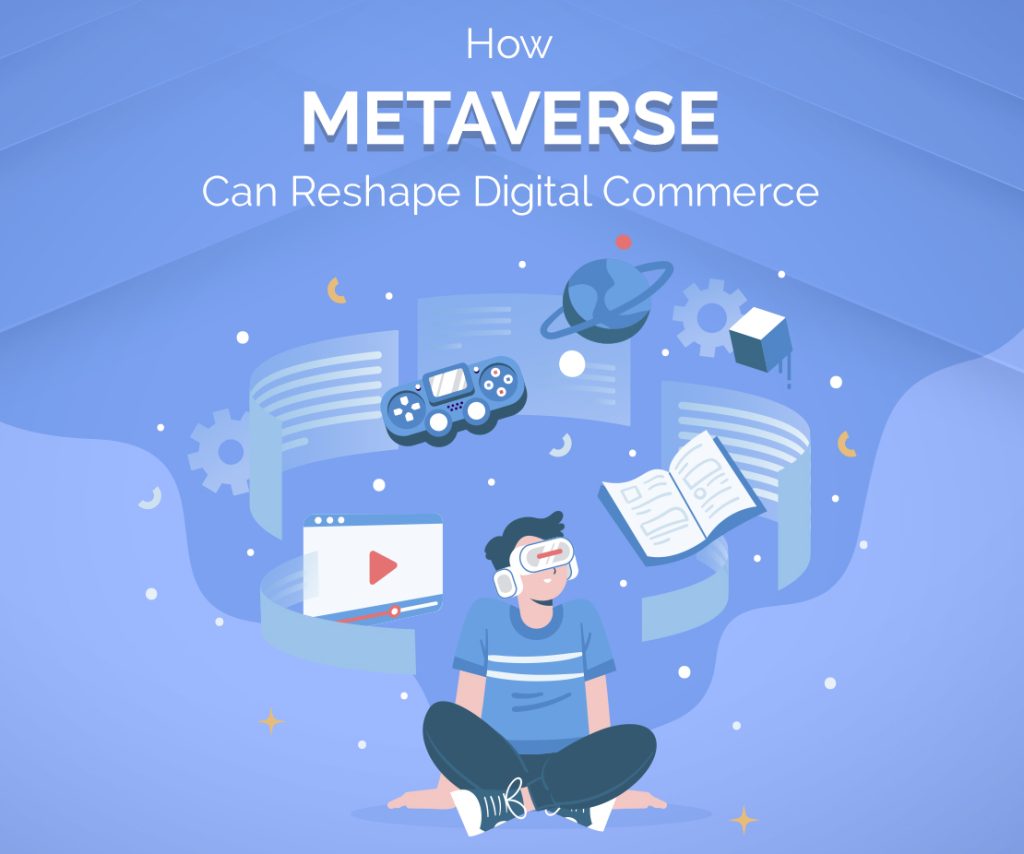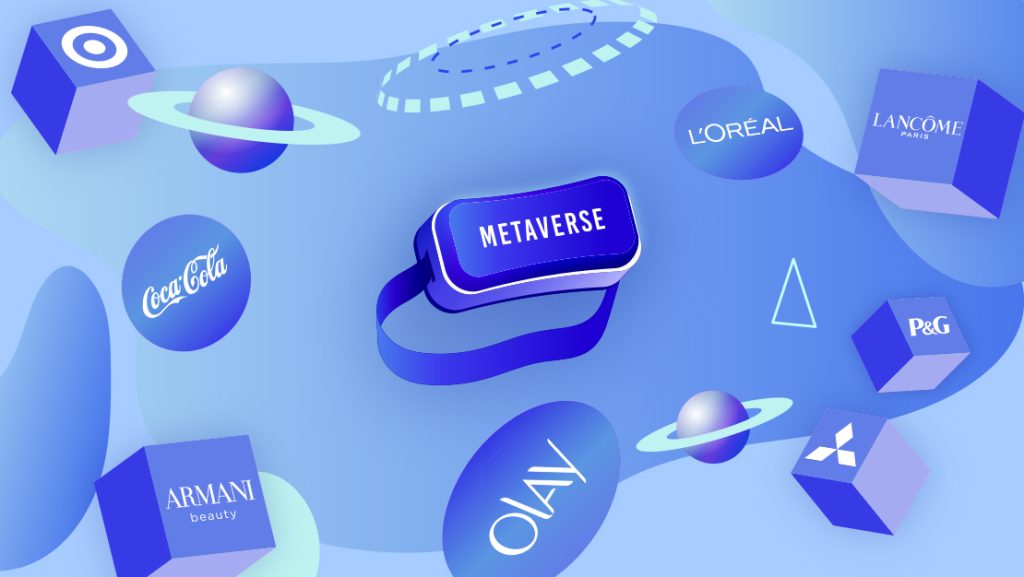How about you get the same-day delivery of your product instead of the next day? Well, it has been a hot topic in the eCommerce industry, where many online retailers promise deliveries within a few minutes or hours of your order.
Now let’s push this image a little more where you get an option to use or experience the product the moment you find it before making an actual purchase! Isn’t it a thrilling experience? Well, it is not more imagination or just a thought. Today, the eCommerce industry is reshaping with each year, thanks to technological innovations.
Starting from Facebook, Adobe, and Microsoft to Unity, Lenovo, and many other leading brands have started investing in the Metaverse or some virtual experience platform for their audience. But how can Metaverse reshape the eCommerce industry? We will find this out in our blog post. In this blog, we will look at the current stage of the eCommerce industry, its challenges, and how Metaverse eCommerce could address those challenges.
Understanding the current state of Digital Commerce
Online shopping has made our lives much easier, and we can’t fathom life without it. During the epidemic era, eCommerce proved to be a lifesaver. It prompted formerly conservative firms to go digital and provide their clients with the option of purchasing their favourite products online without leaving the comfort of their own homes.
Because many shops are considering relocating their companies online, it is estimated that by 2026, the number of users in the digital commerce arena will be approximately 5,179 billion, which is staggering by any definition.
Pain Points of the eCommerce Industry
Despite this, the eCommerce industry still faces several obstacles and flaws. Retailers throughout the world are dealing with difficulties such as:
- User engagement is low.
- Conversion rates are low.
- Bounce rates are high.
- The ever-increasing demands of customers.
- Customer retention is difficult due to fierce competition.
- Ineffective marketing initiatives.
If an eCommerce business owner wants to stay afloat, let alone succeed, they must address their most essential pain issues as soon as possible. They risk losing clients and possibly harming their reputations if they don’t.
Related Article: Everything You Need to Know About Metaverse
Metaverse is the ANSWER to eCommerce pain points.
The metaverse has the potential to solve the majority of eCommerce’s problems and, more importantly, to propel the industry to new heights. Customers in the metaverse will be able to ‘walk’ around a store, look at product displays, and make purchases just like they would in real life — all from the comfort of their homes. It’s a one-of-a-kind combination of the immersive nature of physical retail and the convenience of online shopping.
Metaverse can improve current eCommerce methods and offer unique customer experiences due to its diverse applications and simplicity across the purchasing experience. Let’s take a look at some of the concepts that the metaverse will transform:
How exactly METAVERSE can reshape digital commerce?

- Brings a more personalized experience.
Personalization is the cornerstone of eCommerce success because it aids conversions and client retention. Numerous data highlight the value of treating customers as individuals rather than numbers.
Brands may introduce their customers to exciting and highly tailored digital experiences thanks to the metaverse. By using AR and VR tools, shoppers can get a better impression of the desired goods. They can delve deeper into its details, view it from various perspectives, rotate and zoom it in, read user reviews, and get tips on how to use it.
- Helps increase the customer base for online retailers.
Customers can find precisely what they want using metaverse technology, which will give an immersive experience that will make the entire shopping experience more fun and exciting.
It will assist shoppers in feeling confident about a product’s fit or quality, having fun, and making more educated purchasing selections. As a result, customers are more inclined to use that merchant’s services in the future. Aside from that, they’ll tell their friends and family about the vendor and ask them to go virtual shopping with them.
- Boost the ROI of the eCommerce business.
According to a Google report, 66 per cent of people want to utilize augmented reality technologies while shopping, leading to increased customer satisfaction and willingness to buy things they may try in 3D.
Customers will not only have higher visualization abilities in the metaverse, but they will also be able to speak with store employees. Customers are more likely to become interested in and buy your products if your staff helps to establish a metaverse retail atmosphere in which shoppers can enjoy the complete range of emotions.
Being metaverse’s early adopters, your brand will definitely have an edge.
- Gamify the shopping experience.
The game industry was the first to adopt the metaverse. It has absorbed the industry’s most acceptable practices, and now gamers worldwide may enjoy a diverse range of experiences and opportunities in the metaverse.
In general, metaverse games rely on the play-to-earn (P2E) idea, which allows users to win gaming products and trade them for real money. Furthermore, players in metaverse games can work with other players in an organic environment, as if they were interacting with each other in the real world.
It’s worth noting that metaverse-powered gamification approaches can also be used successfully in the eCommerce industry. You can enable other metaverse-powered entertainment activities and games that customers may participate in while shopping for groceries or clothes, and earning tokens or NFTs that can trade for loyalty benefits, are possible. By combining metaverse gaming with your retail brand, you can create more engaging experiences for your customers.
- Understand your customers’ behaviour more efficiently.
ECommerce business owners can better identify and analyze how their customers engage with and respond to their merchandising and marketing initiatives thanks to metaverse shopping.
Offline commerce is difficult and time-consuming, and even internet commerce has limitations. Brands may obtain more significant insights into the performance of their offers, monitor customer behaviour, and make more personalized recommendations by combining virtual shopping assistants with AR and VR capabilities, all linked into a single metaverse platform.
- Establish a global presence through metaverse advertising.
You can advertise your services or products in the metaverse if you aren’t ready to go big with the metaverse and transfer your brand to the virtual environment.
Traditional billboards are similar to this advertising, but they have more exciting choices. In the metaverse, you can rent a building or a plot of land and begin promoting your businesses there. Many metaverse fans have purchased virtual lands and real estate and leased them to other metaverse users for various purposes, including advertising and events.
It’s already STARTED
Virtual shopping using Metaverse has already started. Here’re some astonishing statistics about Metaverse eCommerce:
- A digital edition of the Gucci bag was sold for more than $4,100. It is more than the actual price of the bag in real life.
- There are four patent and trademark applications for downloadable virtual goods supported by Metaverse that Nike has filed.
- To sell Supergucci NFTs, Gucci opened Vault, a metaverse concept store.
eCommerce Brands that are planning for Metaverse eCommerce
Many well-known eCommerce brands have embraced the metaverse, realizing that a fully immersive metaverse shopping experience can significantly impact their customers’ purchasing decisions. Let’s look at some companies who have expressed a strong interest in the metaverse eCommerce store and are looking to expand their businesses in virtual worlds.

So, do you feel the Metaverse is worth your attention?
Of course! But don’t just go mad about virtual shopping using Metaverse and build a metaverse eCommerce store for the sake of competing. Instead, remember that the Metaverse is still growing and will be a lot more mature in the future.
The youth is more familiar with the meta-concepts. And soon, brands worldwide will try to figure out combining physical and virtual worlds using virtual experience platforms to bring a personalized and seamless shopping experience. At AddWeb Solution, we’re ultra-familiar with the concepts of Metaverse and deliver Metaverse eCommerce solutions like ByondXR – allowing brands to create virtual stores to provide an authentic shopping experience to their customers.
Frequently Asked Questions
The integration of eCommerce and the Metaverse is expected to offer immersive and interactive shopping experiences. Users can explore virtual stores, try on virtual products, and engage in social shopping with friends, creating a more dynamic online shopping environment.
VR will play a significant role by providing users with immersive product experiences. Virtual showrooms, product demonstrations, and even virtual try-ons will become commonplace, enhancing the overall eCommerce shopping journey.
The Metaverse will influence eCommerce platforms to become more visually engaging and interactive. Virtual storefronts, 3D product displays, and personalized shopping environments will likely transform the traditional eCommerce layout.
The Metaverse is designed to be inclusive, offering opportunities for businesses of all sizes. Small businesses can benefit by creating virtual storefronts, engaging with a global audience, and utilizing innovative marketing strategies within the virtual space.
The Metaverse is expected to redefine online marketplaces by introducing new levels of interactivity and personalization. eCommerce businesses must adapt by enhancing their virtual presence, offering unique experiences, and staying competitive in this evolving landscape.
Traditional eCommerce businesses can prepare for the Metaverse by exploring virtualization options, understanding VR/AR technologies, and adopting strategies that enhance user engagement. Investing in innovative technologies and staying updated on industry trends is crucial.
Yes, virtual currencies and blockchain technology are expected to be crucial in eCommerce transactions within the Metaverse. These technologies offer secure and transparent payment methods, providing a more seamless and trustworthy virtual shopping experience.
